Below are a few of our featured courses offered in 2015-2016. To see a full list of course descriptions, please visit the undergraduate course list
GERM 406: Literature and Visual Arts 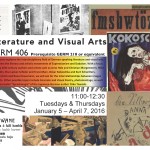

This course explores the interdisciplinary field of German speaking literature and visual arts, and covers the literary and artistic movements of Expressionism and Dadaism. Prerequisite GERM 210 or equivalent. Sign up for GERM406.
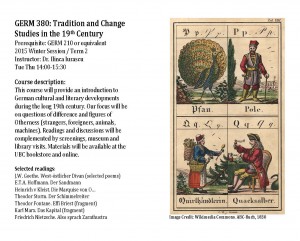

This course will provide an introduction to German cultural and literary developments during the long 19th century. Our focus will be on questions of difference and figures of Otherness (strangers, foreigners, animals, machines). Prerequisite: German 210 or equivalent. Sign up for GERM 380.
RUSS 412: Dostoevsky in Translation
Fyodor Dostoevsky is sometimes called 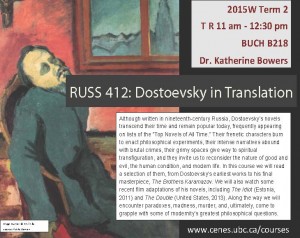

CENS 307: Witches: Myth and Reality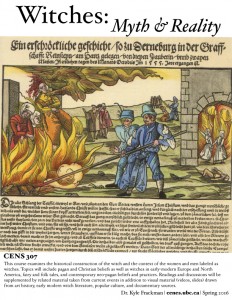

This course examines the historical construction of the witch and the context of the women and men labelled as witches. Topics will include pagan and Christian beliefs as well as witches in early-modern Europe and North America, fairy and folk tales, and contemporary neo-pagan beliefs and practices. Readings and discussions will be supplemented by related material taken from current events in addition to visual material (videos, slides) drawn from art history, early modern witch literature, popular culture, and documentary sources.
Sign up for CENS 307 (note: only restricted seats are currently available)
RUSS 306B: Twentieth-Century Russian Fiction from Modernist Experiment to Postmodern Malaise

This course will explore twentieth-century Russian fiction from modernist experimentation to postmodern malaise, from the idealism of the Revolution to the disillusionment of the late Soviet and post-Soviet periods. Material will include stories, short novels, and poetry, including works by the most famous twentieth-century Russian and Soviet poets and writers, Stalin Prize winners, dissidents, and Nobel Prize winners. As we read, we will discuss historical and cultural context, artistic movements, as well as narrative techniques and form to come to a better understanding of the turbulent twentieth century in Russia.
Sign up for RUSS 306B.
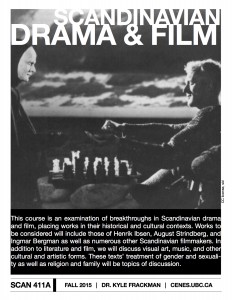

This course is an examination of breakthroughs in Scandinavian drama and film, placing works in their historical and cultural contexts. Works to be considered will primarily include those of Henrik Ibsen, August Strindberg, and Ingmar Bergman. In addition to literature and film, we will discuss visual art, music, and other cultural and artistic forms as they relate to the periods and texts we are discussing. Of great interest will be these texts’ treatment of gender and sexuality as well as humanity, religion, and family. Sign up for SCAN 411A.
RUSS 306A: The Development of the Nineteenth-Century Novel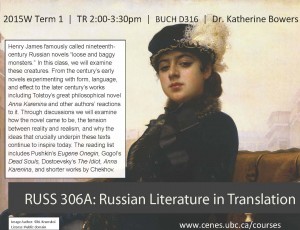

Henry James famously called nineteenth-century Russian novels “loose and baggy monsters.” In this class, we will examine these creatures. From the century’s early novels experimenting with form, language, and effect to the later century’s works including two major philosophical novels by Dostoevsky and Tolstoy, respectively. Through discussions we will examine how the novel came to be, the tension between reality and realism, and why the ideas that crucially underpin these works continue to inspire today. The reading list includes Pushkin’s Eugene Onegin, Gogol’s Dead Souls, Dostoevsky’s The Idiot, Anna Karenina, and shorter works by Chekhov, as well as selected critical scholarship.
Sign up for RUSS 306A.
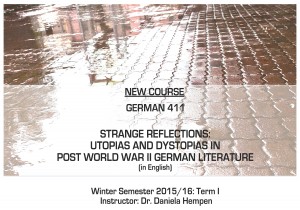

This course explores the manifold ways in which literary utopias and dystopias reflect on Post World War II history, politics and culture in the German speaking countries.
Sign up for GERM 411.
Featured Graduate Courses (taught in English!)
See more graduate course descriptions.
GERM 521: Viennese Modernism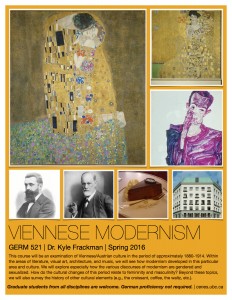

Taught in English. No knowledge of German required. This course will be an examination of Viennese/Austrian culture in the period of ca. 1880-1914. Within the areas of literature, visual art, architecture, and music, we will see how modernism developed in this particular area and culture. We will explore especially how the various discourses of modernism are gendered and sexualized. How do the cultural changes of this period relate to femininity and masculinity? Beyond these topics, we will also survey the history of other cultural elements (e.g., the croissant, coffee, the waltz, etc.).
Sign up for GERM 521.
Taught in English. No knowledge of German required. Elusive and eclectic, kitsch is a category that resists fixed definitions. In the words of Svetlana Boym, the term betrays our “own cultural tastes and times”, pointing to multiple meanings and levels of interpretation, with aesthetic, social and political implications. This course proposes an inquiry into some of its configurations (Orientalist kitsch, Nazi kitsch, communist kitsch, disaster kitsch, high kitsch etc) and kindred figures (trash; pop; camp; the simulacrum; the fetish), with particular focus on German and other European contexts. The lectures will trace aspects of a material history of kitsch in relation to mass production, conspicuous consumption and various forms of cultural resistance. Students will be asked to add their own category to the taxonomy of kitsch and discuss it with the support of theoretical texts and other materials. Sign up for GERM 531A.



